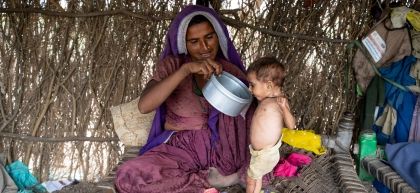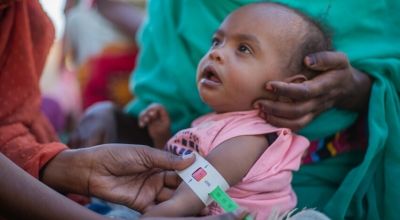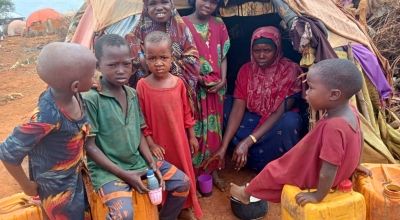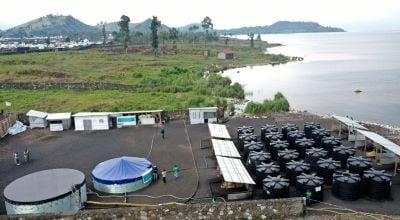
Read our 2022 annual report

Knowledge Hub
Contagion of violence in Syria highlighted in new report from Concern Worldwide
Concern Worldwide is today calling on UN member states and donors to urgently increase protection funding and facilitate humanitarian access to help alleviate the suffering of displaced people living in Syria.
Ahead of the sixth anniversary of the Syrian conflict on March 15, the agency has launched a new report, which highlights civilians’ increased exposure to violence in Syria, not only from the onslaught of war, but from a variety of everyday threats in a society traumatized by conflict. Concern is also highlighting the $180m shortfall in protection funding for programmes and calls on wealthier governments to do more to help vulnerable Syrians at risk.
The report entitled - Shattered Lives: Protecting civilians in war-torn Syria, a shared responsibility - exposes the contagion of violence that has infected all aspects of Syrian society, resulting in ordinary civilians not feeling safe in any environment be that at home, school, work or on the streets.
The report was launched this afternoon at Twitter EMEA offices in Dublin by Minister of State for the Diaspora and International Development, Mr Joe McHugh T.D.
Speaking at the launch, CEO of Concern Dominic MacSorley said:
After six years of war, violence is all pervasive in Syria. It is not confined to the bombing, missile attacks and wanton destruction of cities like Aleppo that we witness through news reports, it has seeped into every aspect of Syrian life to the point where Syrians do not feel safe in any environment, not even in their own homes.
Despite an increasing recognition that protection must form a central pillar of humanitarian response, it remains drastically underfunded with a gap of over 75% of requirements in each of the last two years. The vast shortfall leaves ordinary Syrians more vulnerable to increased levels of violence in their everyday lives.
Access, Mr MacSorley added, remains the greatest obstacle to carrying out humanitarian assistance inside Syria.
Without sustained access, humanitarian organisations can only provide limited assistance to people in desperate need. Concern calls on all parties to the conflict to respect international humanitarian law and allow full and unimpeded access to civilians inside Syria.
Mr MacSorley also stressed that humanitarian aid cannot be used as a “substitute for failed diplomacy” and said diplomatic solutions must be found now for the 13.5 million people in Syria who require humanitarian assistance, particularly the 6.3 million people, who remain displaced inside the country. He added:
Steadfast diplomacy is needed at this moment more than ever. Right now, it may seem like the prospect of an end to the bloodshed in Syria is impossible, but the recent disarmament process in Colombia and, closer to home, the peace process in Northern Ireland, has shown us that solutions can be found in even the most seemingly intractable of conflicts.
In 2016, the greatest number of people in need was in the protection sector, yet protection was one of the least funded sectors. Of the $236 million required for protection in the UN’s Humanitarian Needs Overview, only 24% or $56.5 million, was received, leaving a shortfall of $180 million. Mr MacSorley pointed out that Ireland has already provided €70 million to the Syrian crisis and said that:
Other much wealthier governments can and must do more, in particular the permanent five Security Council members who hold greater influence and responsibility for the continued conflict.
The Concern report spoke to 65 individuals from northern Syria over eight discussions, where they expressed their main protection concerns and proposed initiatives that could mitigate the risks. Approximately 52% were females and 50% of the participants were under 18 years of age and an average of eight individuals attended each discussion.
As the world marks International Women’s Day today, the report, unsurprisingly, finds that women and girls are the most vulnerable to domestic and sexual abuse, harassment and forced marriage and provides first-hand testimony from women and young girls of the violence and sexual harassment they are exposed to on a daily basis.
Among the key recommendations in the report:
- Greater access to education and raise awareness through social media to prevent children from joining armed groups
- Enhanced transparency and accountability to beneficiaries
- Greater focus on providing psychosocial support for girls and women and increase safe spaces, where they can express themselves freely
- Improve the livelihoods of households so that children aren’t forced to work in hazardous environments to support families
- Provide more education, vocational training, and psychosocial support for separated and unaccompanied children
Speaking at the launch, Minister Joe McHugh said:
It is particularly poignant for me to be here just days after undertaking my first official visit to Lebanon and Jordan. During my visit, I spoke directly with the Syrian refugees whose experiences you will encounter inside this report. My time with these communities was deeply impactful. I was struck by their resilience and their capacity to deal with the most challenging and traumatic circumstances in order to achieve safety and security for themselves and their families.
During my visit I had the opportunity to visit Concern’s projects in Lebanon and I commend Concern’s critical and effective work in Syria and the region. I particularly welcome this report, which provides crucial insights into the lives of Syrian refugees that can inform the ways in which we provide our humanitarian support and how we can advocate on their behalf.
To read ‘Shattered Lives: Protecting civilians in war-torn Syria, a shared responsibility’ click on www.concern.net/shattered-lives.
With support from key donors including Irish Aid, USAID, DFID, ECHO and others including generous donations from the public, Concern has been responding to the crisis in Syria for over four years and is also working with refugees in Turkey and Lebanon.
ENDS
More information
For more information or for interviews, please contact Catriona Loughran on 086 783 4846 or via email at catriona.loughran@concern.net.
Note to Editors
- What is humanitarian protection programming? Humanitarian protection is about improving the safety, well-being and dignity of the affected population. It is born out of recognition that the provision of humanitarian aid is insufficient unless the safety and dignity of affected populations is also assured.
- In 2016, Concern had at least 390,000 direct beneficiaries in Syria across all sectors. The total population reached by Concern’s response to the Syria crisis through programmes in Syria, Turkey and Lebanon in 2016 was 650,000.
- Concern is locally well-recognised as an effective and well-prepared emergency responder, continuing to bring critical life-saving and life-sustaining food and household items to people fleeing from conflict and in their places of refuge.
- Illustrations of Concern beneficiaries in the report were created by Wicklow-based artist Marc Corrigan.





